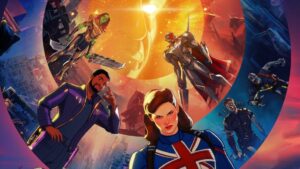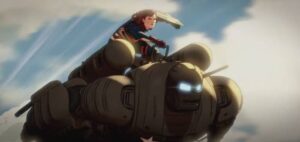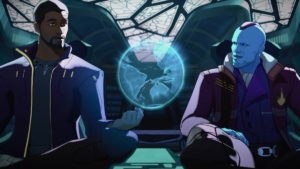SPOILERS FOR LOKI AHEAD!
The cost of free will in the Marvel Cinematic Universe(s) was high: so high we can’t even begin to comprehend the vast number of ramifications that will spin out of Loki‘s climactic finale…so high that I’m still not entirely sure what actually happened in this episode, except that notably no one died, leaving all our major players on the board heading into what will surely be an even stronger and stranger second season (and oh yes, season two is very much a go: Clark Gregg spoiled that over a year ago, in fact, but a mid-credits stinger at the end of today’s episode outright confirms it).

I do want to touch on that latter fact before we dive into the embarrassment of riches this finale has to offer in and of itself. Unlike WandaVision and (at least for now) The Falcon And The Winter Soldier, Loki is not and was not planned to be a miniseries, which means its stories, thematic through-lines, and character arcs don’t all wrap up conclusively at the end of this first season. They each have satisfying payoffs for the time being, but…they’re a work in progress, which makes it more difficult to pass any kind of final judgment on them.
Take, for example, the romantic arc between our dual protagonists, Loki (Tom Hiddleston) and Sylvie (Sophia Di Martino). Adored by some as a positive message of self-love, loathed by others as being just shy of incest, either way it’s been building towards something: and that something is a pretty powerful kiss in the final minutes of the episode, albeit one which Sylvie uses to her advantage so she can send Loki hurtling through a portal into another timeline while she deals with the series’ antagonist alone. That arc is by no means finished. Loki loves Sylvie deeply, and he makes that clear when he tells her he can’t bring himself to fight her. Sylvie loves Loki too, and it seems to physically hurt her because of how hard it is for her to trust anyone. That kiss is a great payoff to the journey these two have been on, and it can be a great building-block for future tension and conflict in their relationship.
Similarly, throughout the series we’ve seen Loki become capable of unprovoked acts of empathy, courage, and rational thinking for pretty much the first time in his life. That’s not to say he still doesn’t struggle: when Miss Minutes (voiced by Tara Strong) pops up in the Citadel at the End of Time like a horror-movie jumpscare to offer Loki and Sylvie the future of their dreams as a last-ditch effort to save the Sacred Timeline, the pained expression on Loki’s face and Natalie Holt’s gently wailing Asgardian theme (subtly reminding us of the pain and trauma Loki suffered on Asgard, the motivation for so many of his cruelest deeds) suggest that he’s strongly tempted to take what the animated clock is willing to give him – a timeline in which he prevails at the Battle of New York, survives his encounter with Thanos, and obtains the Infinity Gauntlet.
But the thing is, Loki wants to be a better person than what the Sacred Timeline has planned for him. He’s seen the best of what people – including his own Variants – are capable of, and he wants that, both for himself, and for the people whom he’s grown to love. He wants Sylvie to live the life of her choice, without the Time Variance Authority hounding her for whatever reason. He wants Mobius (Owen Wilson) to be able to live the life that was taken from him by the TVA, maybe even get a jet-ski along the way. He wants to be good, and the only way to do that is to free the timeline…which he does. And if Loki was a miniseries, this would have allowed for a triumphant conclusion to his arc. But it’s not, so this is merely the beginning of what can potentially be a fascinating internal struggle for him as he grapples with doubt, guilt, and perhaps an acknowledgment of the fact that he no longer has an excuse to not be good.
Oh yeah, no biggie, but Loki and Sylvie opened the Multiverse…for real, this time. We all kind of jumped the shark after episode two, thinking Sylvie bombing the Sacred Timeline was equivalent to creating a Multiverse (it wasn’t, and that was something the show nearly adequately clarified), and before that during the WandaVision era we all assumed Wanda would open the Multiverse even though, ironically, she ultimately progressed enough as a character to stop herself from doing that (different strokes for different folks), but this time there can be no doubt. The MCU has officially crossed what Kang the Conqueror (Jonathan Majors) refers to as “the threshold”, a Nexus Event from which there can be no turning back: the Sacred Timeline he’s worked so hard to design and cultivate is finally unraveling piece-by-piece, shedding billions of new branch timelines every moment, and making Multiversal war a matter of “when”, not “if”.
Speaking of which, this event clearly provides the launchpad for Marvel’s fourth Disney+ show and their first animated project, What If…?, which we can now surmise will kick off with this chronological equivalent to the Big Bang, exploring timelines diverging from the events of the MCU films. Spider-Man: No Way Home will also continue the Multiverse saga (suddenly, it doesn’t seem so unlikely that Tobey Maguire and Andrew Garfield are in the movie), and Doctor Strange In The Multiverse Of Madness will either end it or further exacerbate the situation. Given that Kang is still officially set to make an appearance in Ant-Man And The Wasp: Quantumania, and the version of Kang we met in this episode is already dead, I’m inclined to guess the latter. Loki is also now reported to appear in Multiverse Of Madness, so let’s just say the MCU is getting weird.

I mean, I already suspected that when the Loki finale opened with the disembodied voices of our beloved Marvel heroes playing over the title cards, mixing with audio of real-life figures including Nelson Mandela, Maya Angelou, Greta Thunberg, and Malala Yousafzai – all meant to convey the disorienting effect of crossing over from the Sacred Timeline, which takes shape as a ring encircling Kang’s Citadel, into an alien region outside of time and space. The Timeline’s circular shape is interesting to me: for one thing, it once again brings to mind images of the Midgard Serpent from Norse mythology, Loki’s monstrous offspring which wraps around the world and bites its own tail. But it also explains the strange nature of time in the TVA, how everything past, present, and future, seems to be happening simultaneously even though the TVA’s own diagrams misleadingly represented the Timeline as a straight line. Circles are potent symbols, as they can have both positive and negative connotations, representing everything from perfection, wholeness, and eternity (i.e. Sacred Timeline) to a sense of meandering and endless repetition. From Crystal Clear Intuition, “A circle protects against chaos and unpredictability, and invites an element of “trusting the universe””, which perhaps helps to explain why Kang chose it: it’s foolproof against Loki’s.
Before I start rambling about the symbolism of circles (and oh boy, am I tempted), let’s move on to my next point: which is that Kang actually wants the Loki’s to succeed, as long as they do it on his terms. It’s never explained exactly why (and that is something I wish we’d learned in this season), but he’s been guiding Loki and Sylvie to his Citadel specifically so they can take over as new heads of the TVA, continuing his life’s work (did I mention that circles also represent transition?) with the same set of authoritarian instructions for how to pick and choose which timelines get inducted into the Sacred Timeline, and which get pruned; sacrificing free will for the promise of stability across all of time. The other option, which Kang wearily admits will end up with him back in the Citadel in a couple of eons starting over again, is to kill Kang and free the timeline, thereby starting a Multiversal war and unleashing the infinitely more dangerous and evil Variants of Kang who also started the first Multiversal war.
Essentially, it’s like a dark and epic twist on Charlie And The Chocolate Factory, if Wonka was a maniacal Time Lord hellbent on controlling all of existence, and the Chocolate Factory and its workforce of Oompa-Loompas were the TVA and its army of cheerfully brainwashed Variants.
Now, it’s not quite perfect. The finale, despite being a lean forty-five minutes long with credits (and no post-credits scene), drags at points, and the bulk of the episode being Kang sitting behind a desk expositing in slow loop-dee-loops about the Multiverse while Loki and Sylvie sit stone-faced across from him and do little to engage with the information or react to it is neither compelling in theory nor heightened in execution by any outstanding narrative trick from the writers (even punctuating the conversation with more frequent action beats or slight changes in location would have helped to keep the episode running more smoothly), unique cinematography, or mesmerizing acting choices.
Jonathan Majors’ Kang is an interesting conundrum: simultaneously eccentric in a bold purple and green outfit with flamboyant, theatrical mannerisms, and muted, with slow and disjointed line deliveries just grating enough to provoke a sigh of relief when Kang finally drops the act, so to speak; revealing an exhausted, weather-beaten noble figure behind all the self-gratifying affectations of a character whom I was beginning to worry was looking mighty two-dimensional for a villain Marvel intends to keep around. But of course, he’s only the first of many Kang Variants to come, and this version of the character has long since dropped the Kang from his name and scoffs at the title of “Conqueror”: he prefers the honorific He Who Remains, an acknowledgment of his permanence, and an opportunity for an interesting conversation about how his name and even his identity matter less than his place and purpose in the timeline, which helps to make this Mystery Box reveal a success. With He Who Remains dead by the end of the episode, one can reasonably hope that when our next Kang Variant appears, he’ll embody more of that dignity which we only get to glimpse in this threadbare version.
And while it’s hard to imagine Judge Ravonna Renslayer (Gugu Mbatha-Raw), Kang’s love-interest in the comics, ever falling for He Who Remains, it’ll be interesting to see if the series pursues a romance between her and one of Kang’s Variants. Renslayer is one of those characters who’s really grown on me over the last few episodes, as Mbatha-Raw has gotten a chance to dig into what makes the villainous bureaucrat tick. She genuinely wants to know who’s behind the TVA, and she’s angry at being lied to, but not for quite the same reasons as Mobius or Hunter B-15 (Wunmi Mosaku): rather than being upset about having her past life stolen and erased by the TVA, she’s simply annoyed that something is preventing her from doing her job to the fullest and hurting the maximum amount of people that she could be hurting if she knew the will of the TVA’s founder. Near the episode’s end, she departs on a search for Kang that will inevitably lead her to one of his Variants – a far cry from her past life as an elementary school teacher in Ohio, but a way to keep the character deeply intertwined with Loki‘s story.

As for Loki and Sylvie themselves, the finale separates them in time for the cliffhanger ending that leaves Loki in an alternate timeline where the TVA is ruled over by a Kang Variant who makes his presence known with giant statues replacing those of the Time-Keepers, and Sylvie in the Citadel, watching with horror as the Sacred Timeline disintegrates before her eyes. A lifeless Kang with Sylvie’s sword plunged into his chest offers no guidance or words of advice for how to deal with the catastrophe. I guess it’s time to get Doctor Strange on the phone! And maybe Wanda Maximoff too, while we’re at it. We are totally going to see Marvel’s holy trinity of magic-users onscreen together in Multiverse Of Madness before we even get around to Loki season two, and I am HYPED.
Episode Rating: 8/10








